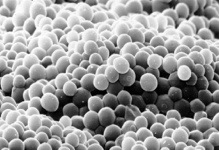
Treating Oak Chips with Fungi May Increase Extractability of Oak Character In Wine
| December 22, 2011

Source: http://s1.hubimg.com/u/3794564_f520.jpg
As a result of the relatively high cost of oak barrels, winemakers have been searching for a comparable alternative at a fraction of the cost. Oak chips, while somewhat taboo in their earlier days, are gaining favor among winemakers as being a good alternative to the traditional oak barrel.
One recent study has provided some evidence for a way to increase the extractability of oak character from oak trips, using a novel method of first treating the chips with fungi prior to use.
Producing staves for barrel or oak chips is not a fast process. One of the lengthiest steps is the outdoor seasoning process, which takes anywhere from 24 to 36 months. It is during this time that the wood undergoes many biochemical transformations of biopolymers and other compounds by fungi and bacteria. These fungi also hydrolyze wood heterosides, which result in a decrease in bitterness and astringency.
One of the purposes of treating oak chips with fungi is not only to increase the extraction of oak character from the chips, but to also speed up the seasoning/production process of the chips themselves.
Using several different types of fungi, and combinations thereof, scientist have found that certain volatile compounds in wine are enhanced, thereby allowing the possibility of tailoring a wine to show desired aroma/flavor profiles. More specifically, some fungal treatments resulted in increases of guaiacol and syringol, while other fungal treatments resulted in increases of furfural and benzylaldehyde.
The authors of this study claim that the microfungal treatment of oak chips increases the concentrations of some volatile components in red wine during aging. It may be possible, that with fungal treatment of oak chips for the aging of red wines, to tailor the flavors and aromas to those desired for a particular style of finished wine.
This study is one of the first to provide evidence of enhancement of oak character in wines treated with oak chips, by first treating the chips with fungi. Of course, more work needs to be done regarding potential health consequences of adopting this type of treatment in winemaking, however, the initial results are promising for those wineries interested in alternatives to oak barrels at a fraction of the cost, that result in wines that are comparable in style and quality more…
About The Author
Rebecca Yeamans
Becca Yeamans is the owner/writer of the science-based wine blog, The Academic Wino, as well as the Tasting Room Manager at a vineyard in central Virginia. With a Bachelor of Science in Biology and a Master of Science in Environmental Science, her solid background in science and research allows her to approach wine blogging with a unique style that is both informative to those in the industry, and entertaining for those simply wishing to learn.

